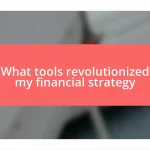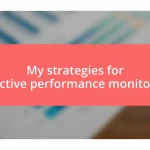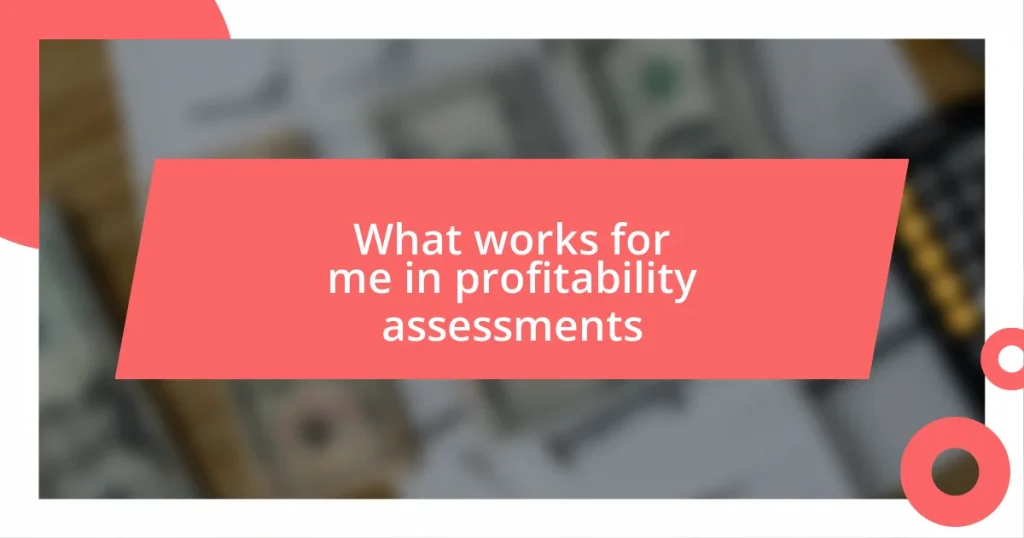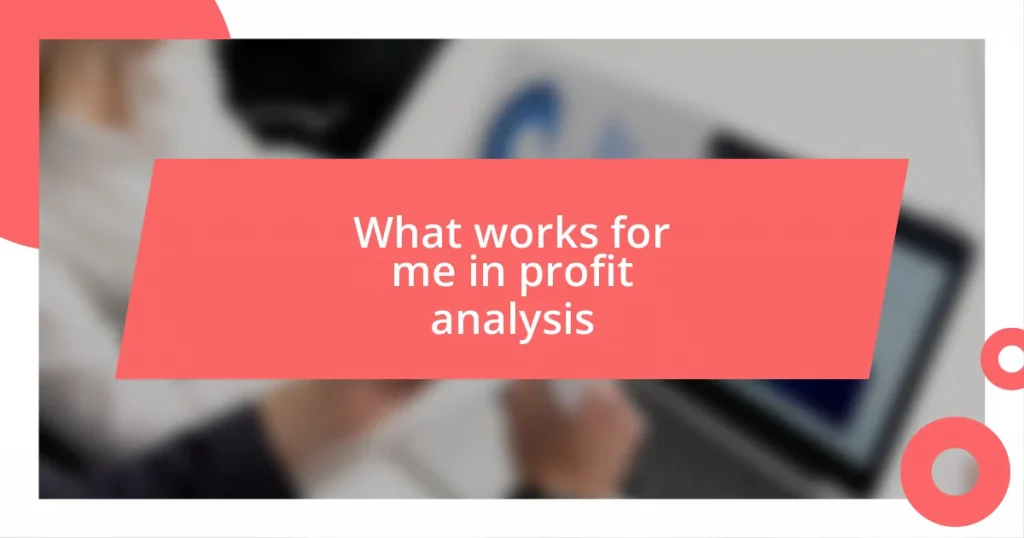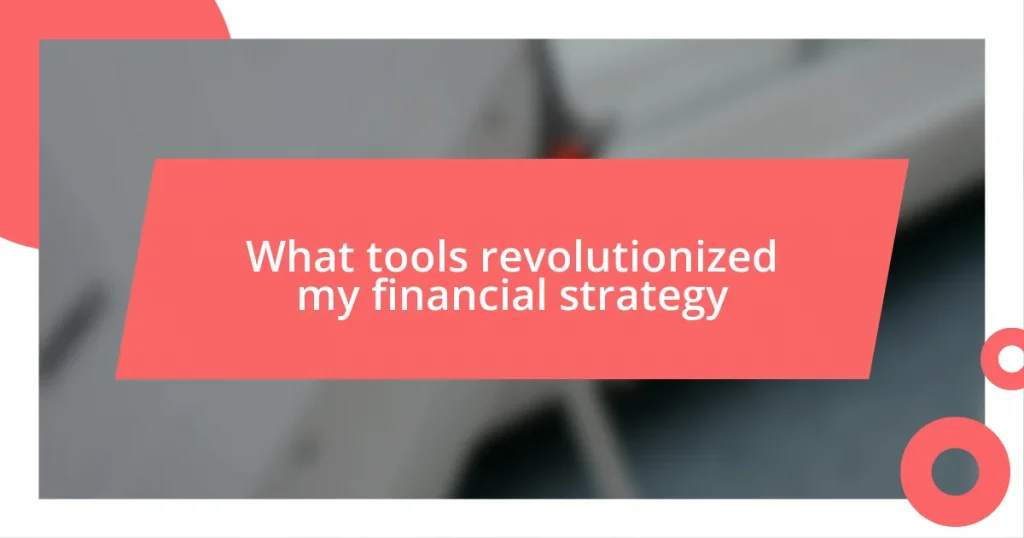Key takeaways:
- Holistic financial reviews emphasize the interconnectedness of spending, saving, and investing, leading to better financial decision-making.
- Comprehensive analysis helps identify patterns, align goals, manage risks, and reduce financial anxiety through regular assessments of income, expenses, and investments.
- Utilizing financial tools like budgeting apps, calculators, and personal finance journals enhances awareness and accountability, fostering proactive financial management.
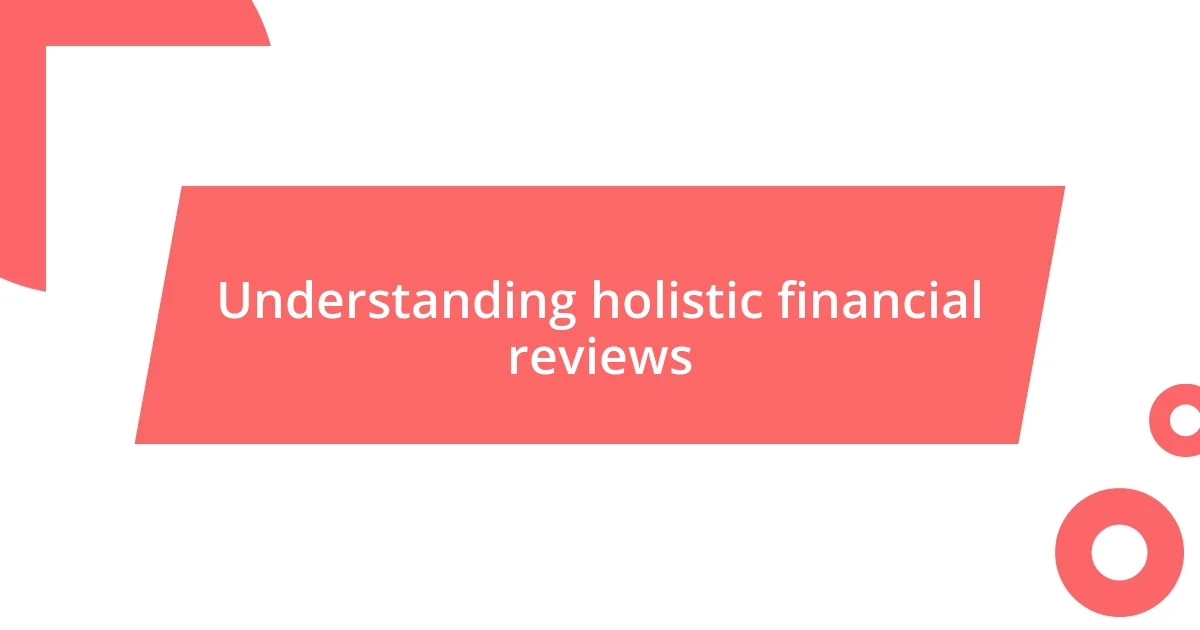
Understanding holistic financial reviews
Holistic financial reviews focus on viewing your finances as an interconnected system rather than isolated parts. I remember when I first discovered this approach; it felt like unlocking a new level of understanding. It made me realize that my spending habits, savings goals, and investment strategies were all intertwined, impacting one another in ways I hadn’t considered before.
When conducting a holistic review, I often ask myself how my short-term money choices align with my long-term aspirations. For instance, I once splurged on a luxury vacation, only to realize later that it set back my retirement savings. It’s a powerful lesson that has shaped how I prioritize my financial decisions now, emphasizing the importance of a comprehensive perspective.
Moreover, this method encourages you to consider emotional factors and personal goals. How do my values shape my financial strategies? I’ve found that when I align my spending with what truly matters to me, like supporting local businesses or funding my children’s education, my financial stress diminishes. Connecting my money choices to my core values has been transformative, creating a more fulfilling financial journey.
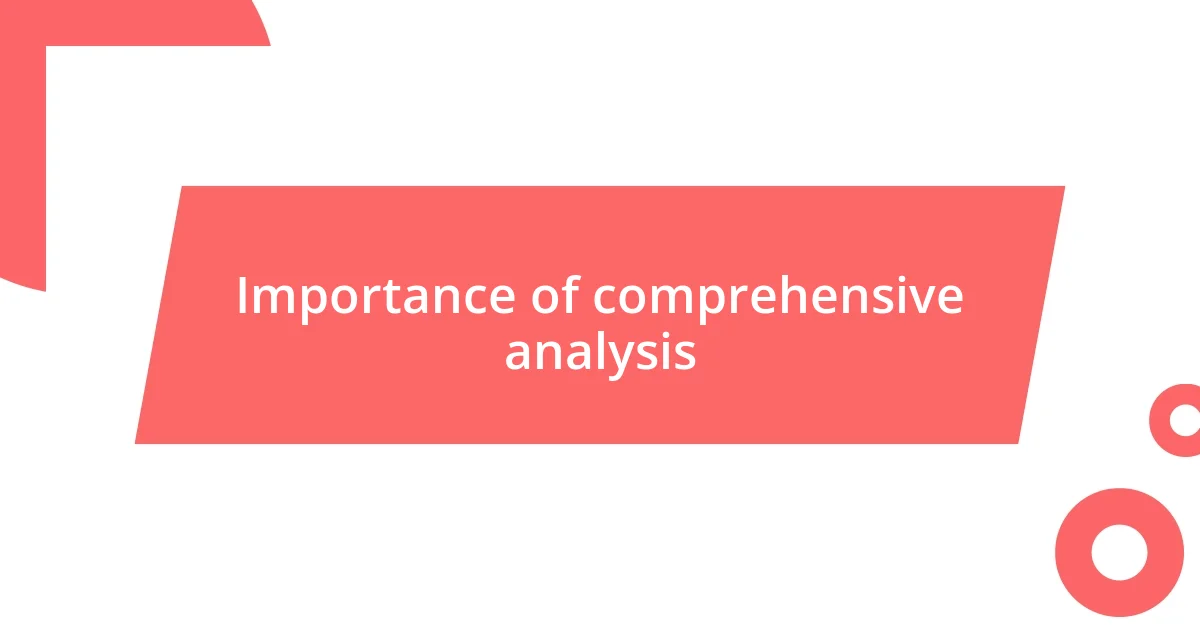
Importance of comprehensive analysis
Comprehensive financial analysis is crucial because it allows for a deeper understanding of how various financial elements interact. I can’t stress enough how my own experience underscored this. A few years back, I underestimated the impact of my monthly subscriptions—they seemed harmless, but they buried my savings plans. This reflective analysis of my finances helped reveal patterns I never saw, empowering me to make smarter decisions.
Consider these key points about the importance of comprehensive analysis:
- Interconnected Insights: Every financial decision influences others, revealing a holistic picture that can guide better choices.
- Goal Alignment: Understanding how each aspect of your finances aligns with your personal and professional goals ensures you’re moving in the right direction.
- Risk Management: A thorough analysis helps identify potential risks and gaps in your financial strategy, allowing for proactive adjustments.
- Emotional Peace: Being aware of how your finances connect to your emotions provides clarity, reducing anxiety around money.
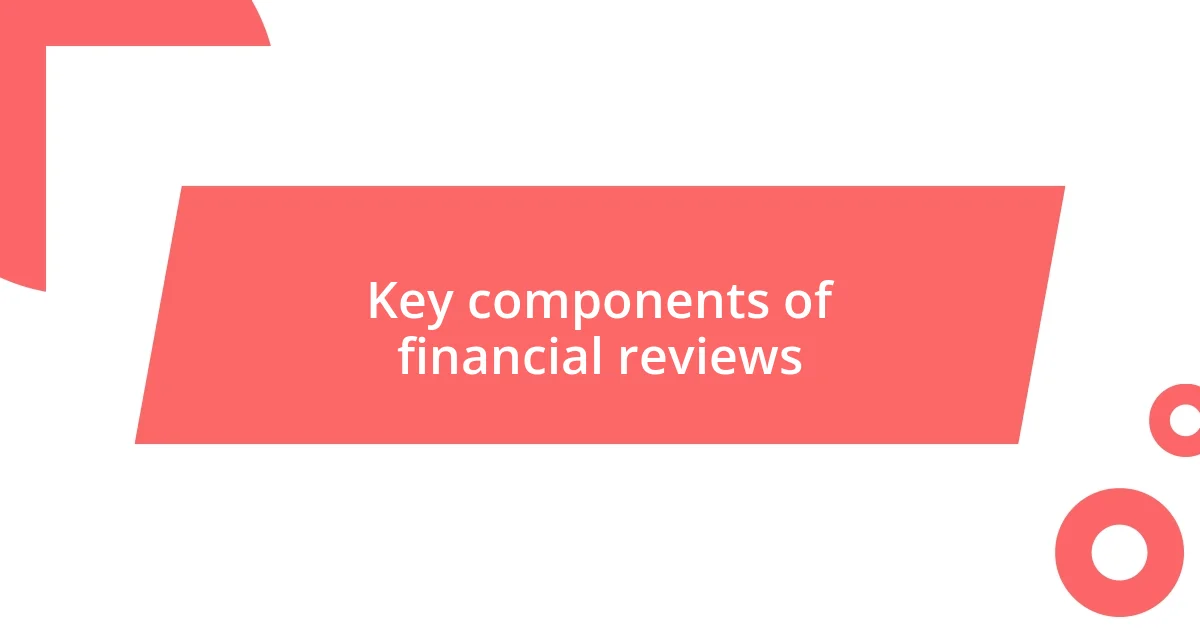
Key components of financial reviews
Financial reviews are multifaceted and require attention to various key components. One critical aspect is assessing income sources. I vividly remember the moment I realized that diversifying my income streams—not just relying on my salary—had a profound effect on my financial stability. Beyond the basics, I now explore side hustles, passive income, and even investments in stocks or real estate. Each source contributes uniquely to my overall financial landscape, emphasizing the importance of a diversified approach.
Another essential component is reviewing expenses. It’s shocking how often I’ve discovered hidden costs just by tracking my monthly spending. For instance, I once found that overlapping subscriptions were draining my budget without providing substantial value. Regularly analyzing expenses not only helps in identifying unnecessary spending but also in reallocating funds towards goals that truly resonate with me.
Finally, evaluating savings and investment strategies is indispensable. I recall the time I shifted my focus from simply saving to investing wisely. That shift made all the difference, allowing my money to work for me rather than sitting idle. By taking proactive steps to review my investments regularly and adjust them based on market trends and my shifting goals, I’ve fostered a sense of empowerment over my financial future.
| Key Component | Description |
|---|---|
| Income Sources | Assessing and diversifying income streams to enhance financial stability. |
| Expense Review | Analyzing spending patterns to identify unnecessary costs and reallocate funds for better results. |
| Savings & Investments | Regularly evaluating and adjusting savings and investment strategies for optimal growth. |
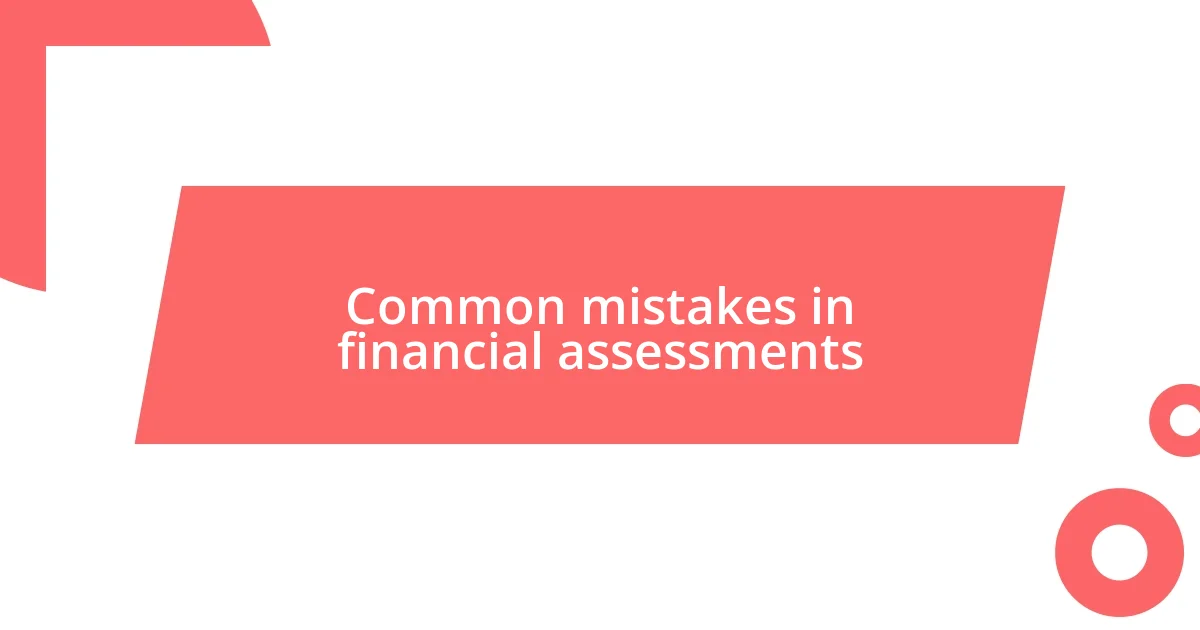
Common mistakes in financial assessments
Many people overlook the importance of tracking cash flow accurately. Early in my financial journey, I thought that monitoring only my major expenses was sufficient. However, I learned the hard way that small, impulsive purchases can accumulate significantly over time. Have you ever checked your bank statement and wondered where all your money went? It’s a common pitfall that leads to unanticipated gaps in budgeting.
Another common mistake is failing to set specific financial goals. Initially, I had a vague idea I wanted to save, but I wasn’t clear on why or for what purpose. Working with a coach helped me realize that without defined objectives, it’s easy to lose motivation. I remember vividly how setting a concrete goal to save for a dream vacation energized my savings plan. It transformed my approach to money from passive to proactive.
Finally, neglecting to revisit financial assessments regularly can be detrimental. After significant life changes, like a new job or moving to a different city, I used to stick to my old budget without reassessing my situation. This oversight often left me feeling unprepared for unexpected expenses. Have you updated your budget lately? Regularly revisiting your financial assessments not only keeps you on track but also allows for adjustments that reflect your current circumstances, ensuring you stay in control of your financial journey.
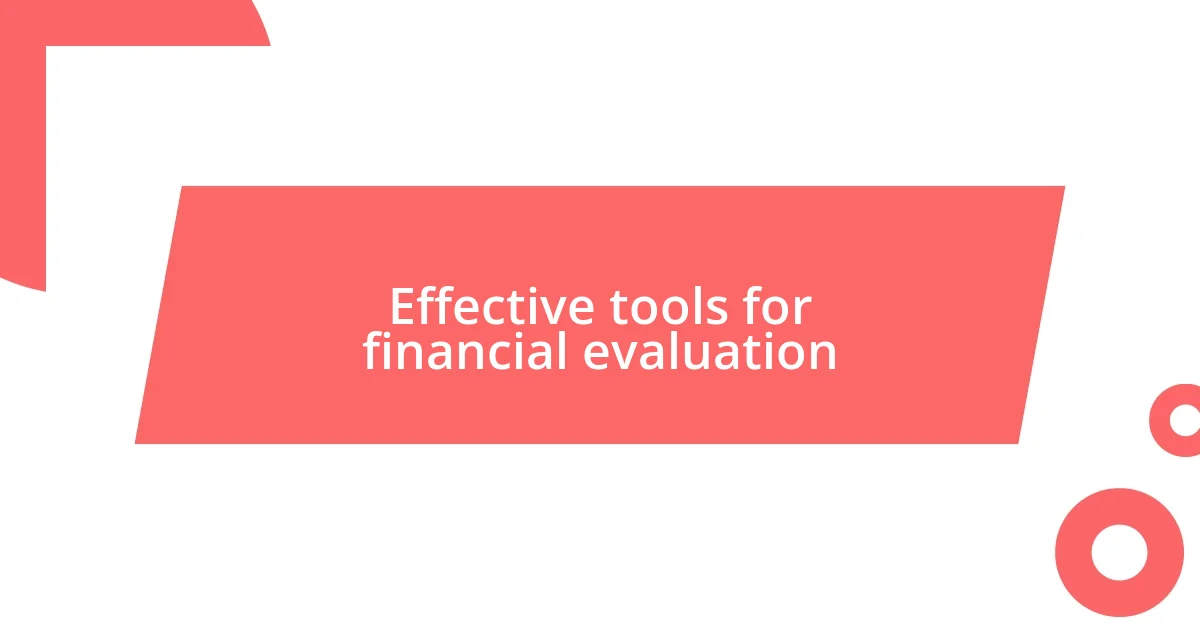
Effective tools for financial evaluation
Investing in the right financial evaluation tools can significantly elevate your understanding of your financial health. I remember when I first discovered budgeting apps; they transformed how I managed my finances. By tracking my spending in real time, I felt empowered to make informed decisions rather than waiting for the end of the month to sift through my statements. Have you ever thought about how technology could simplify your finances? It’s worth exploring the myriad of options available today, from apps that automatically categorize expenses to those that offer visual dashboards of your financial status.
Another tool I find incredibly useful is financial calculators—specifically for investments and savings. I recall sitting down with one to project how a small monthly contribution could grow over time through compound interest. It was an eye-opening experience. Watching that growth potential illustrated how even modest investments today can lead to substantial financial outcomes in the future. Isn’t it exciting to think about how small changes can lead to big results in your financial landscape?
Lastly, a personal finance journal is a unique tool that often gets overlooked. Writing about my financial journey has not only helped me track progress but has also fostered a deeper connection to my money. By documenting my thoughts and emotions related to financial decisions, I’ve gained insights into my spending habits and areas where I can improve. Have you ever experienced a ‘light bulb’ moment by simply reflecting on your spending? Keeping a journal can reveal patterns and motivate you to stay on course, paving the way for better financial decisions down the line.
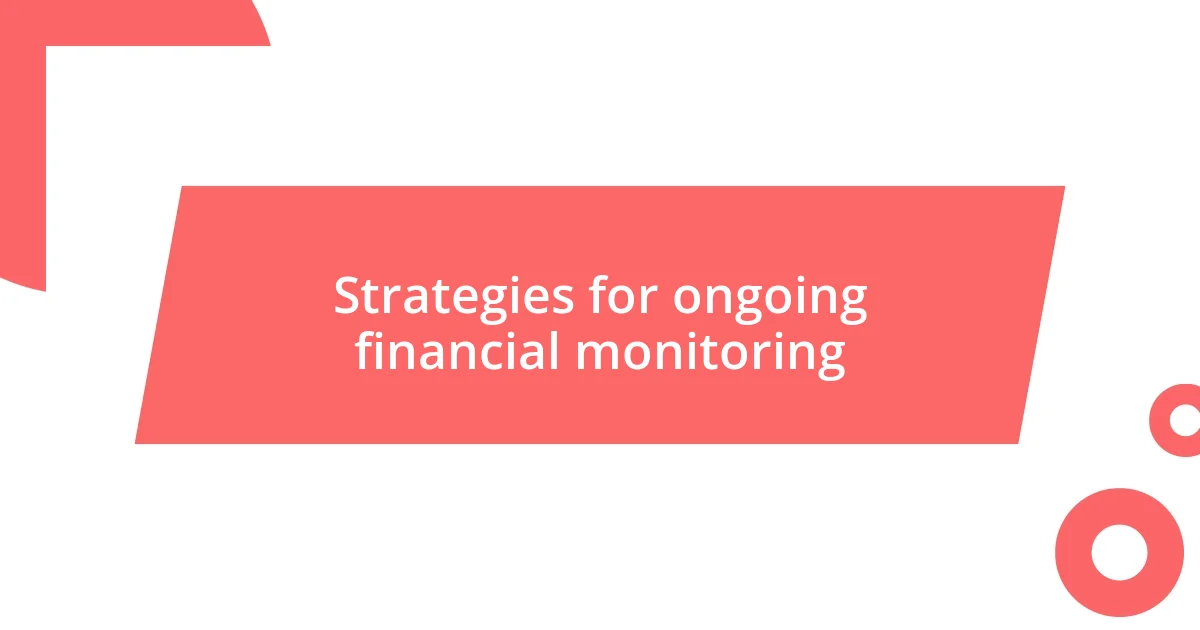
Strategies for ongoing financial monitoring
Monitoring your finances doesn’t have to feel like a chore. For me, establishing a routine was key. I set aside a specific time each week to review my spending—almost like a sacred appointment with my financial health. During these moments, I reflect on my week’s expenses and adjust my budget as needed. It’s empowering, almost like a mini refresh that keeps me grounded. Have you ever set aside time just for this purpose?
One effective strategy I use is to create visual reminders of my financial goals. I often make simple charts or even a dream board that layout my objectives, such as saving for a home or building an emergency fund. Every glance at these visuals rekindles my motivation, reminding me of the bigger picture. Do you have a way to visualize your financial aspirations?
Another approach I’ve found beneficial is to regularly engage with online financial communities. Sharing insights and challenges with others keeps me accountable. I recall a time when I was struggling to stick to my savings plan, and a supportive member shared their own journey, which reignited my determination. Have you thought about connecting with others who share similar financial goals? It can turn your solitary journey into a collaborative adventure.


